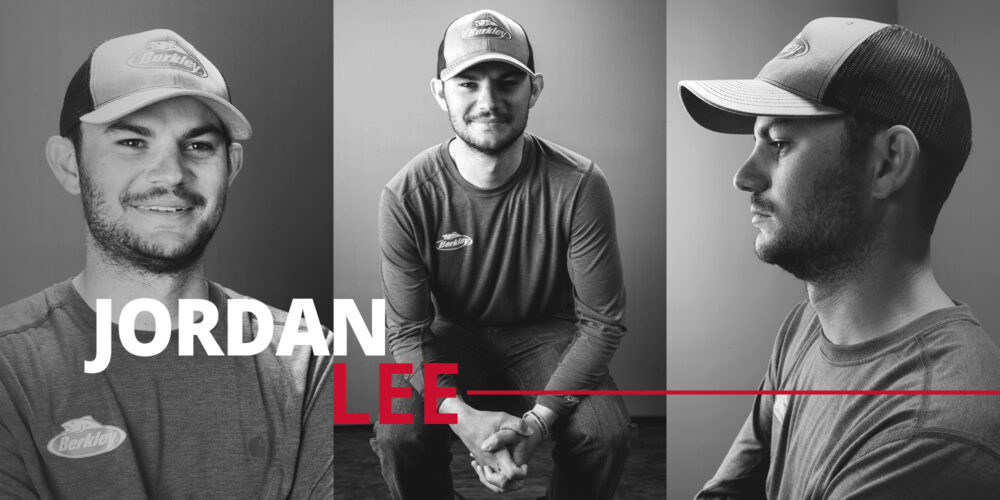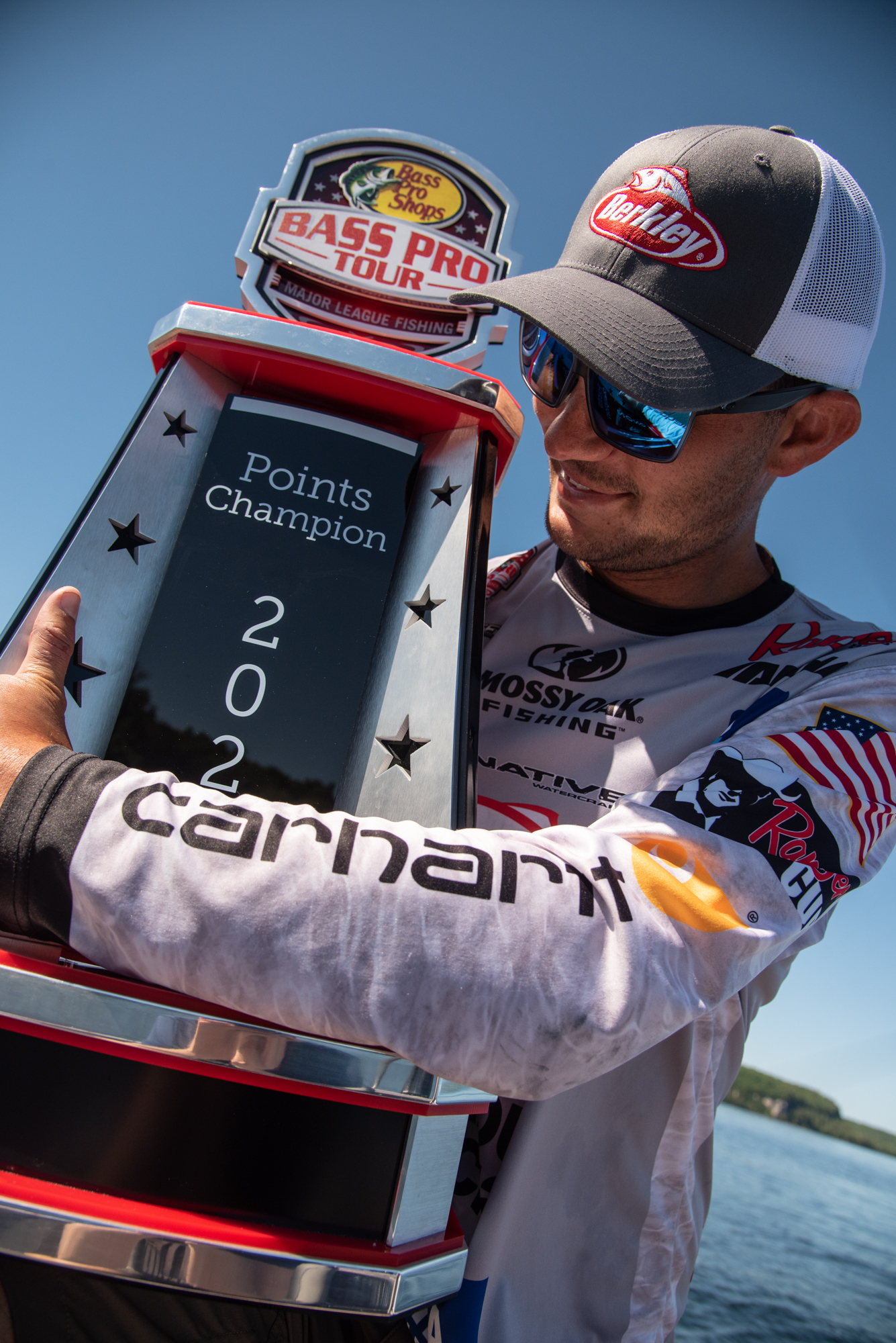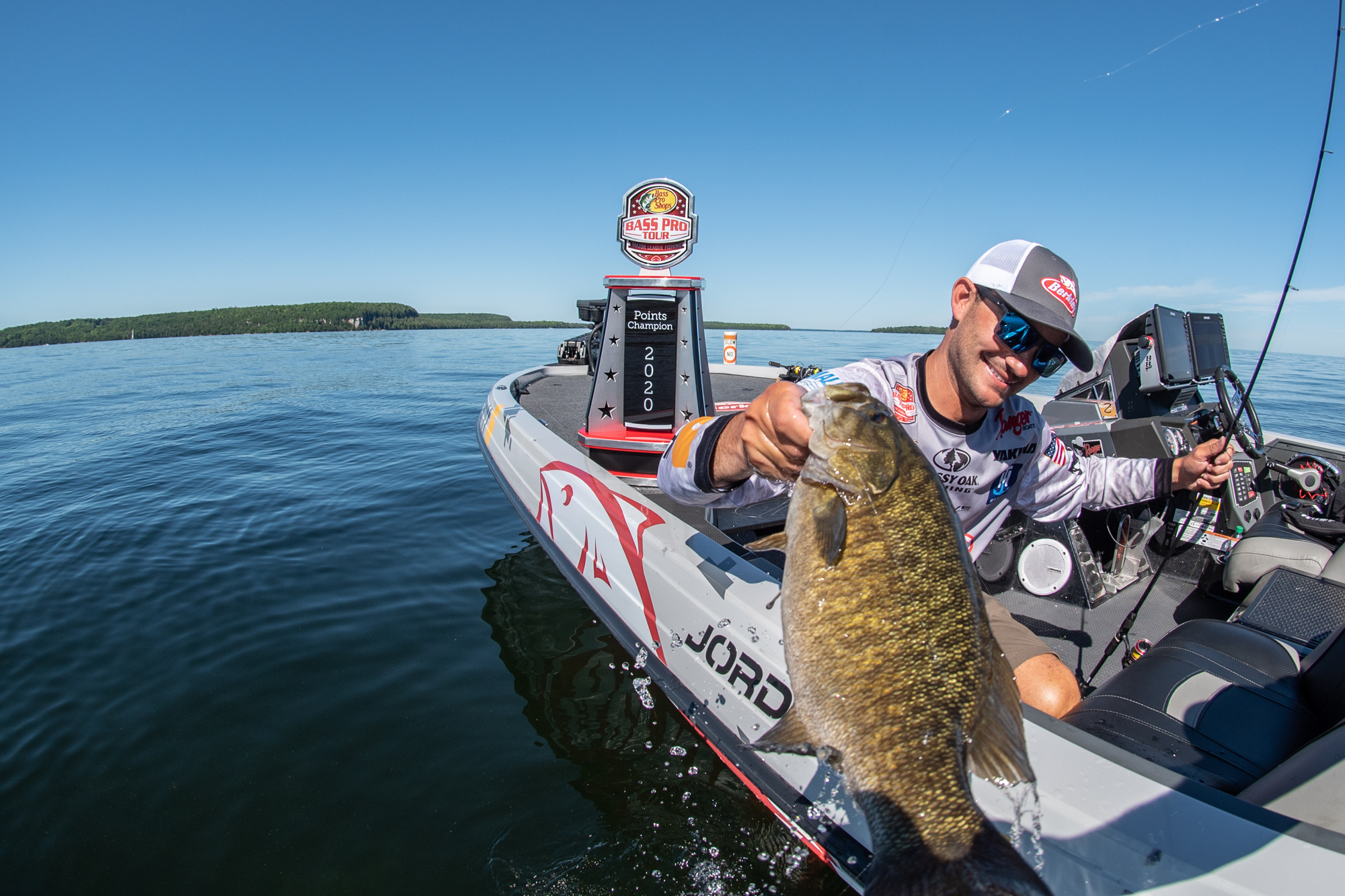The Jordan Lee Q&A
Winning the Points Championship, Steep Learning Curves and “Natural” Fishing with the Alabama Pro

There’s not a tournament bass angler in the world who doesn’t want some of whatever MLF pro Jordan Lee is cooking.
The 29-year-old Alabamian has been a tour-level pro for only six years, but his accomplishments are already worthy of a successful (borderline Hall of Fame) career. He recently claimed the 2020 Bass Pro Tour Points Championship just one month after the 2020 Heavy Hitters championship (and the $200,000 payday that came with it). He won the champion’s trophy in the first MLF Bass Pro Tour event ever contested in 2019, just one year after claiming back-to-back Bassmaster Classic titles in 2017 and 2018. He has tournament winnings creeping up on $2 million, and one of the highest Top-10 percentages in the history of the sport.
Nevermind the accolades and earnings, though; as the 2020 Points Champion has declared on several occasions: “I don’t do this for the money or the trophies, I just really love to catch fish.”
And he means it.
We dug into some of the things that make this easygoing wunderkind tick. What about Jordan Lee makes him such a keg of dynamite once lines go in and competition starts? Some of it may surprise you:
Q&A
You’re driving around Wisconsin between events with a brand new trophy in your rig. You’re the 2020 Bass Pro Tour Points Champion, congratulations.
JL: I appreciate that. It’s always a goal every year to win that, and every year it dwindles down if you have one bad tournament. I was leading going into the last tournament this year at Sturgeon Bay and felt like I could actually win it, but it’s really tough to be that consistent throughout the year and not have a bad tournament. I had a couple of tough days here and there, but no bad tournaments.
I’ve been close several years, but this was the year I felt like I could close it. It was just a dream year. Out of all my accomplishments, it’s probably the hardest thing I’ve ever pulled off.

What is it about a year-long competition that makes it so hard to win?
JL: With all the weather changes and crazy things that happen in our sport, there’s a lot that you can’t control. We all strive to win this award, but man, it’s tough. Everything changes so much all the time, it’s really hard to stay consistent from start to finish. It feels awesome to be able to pull it off fishing against this group of guys.
Is this your first season ‘MVP’ award?
JL: I won AOY the first year I fished tournaments back home in Alabama when I was 17, but this is the only one I’ve ever won at this level. I’ve been fishing at the top level for six years or so, and never really been in the running to win a points title until this year.
I hear you referred to as a “natural” quite a bit: “Oh, that Jordan Lee, he’s just a natural.” I’m sure you’ve heard it plenty, too, but do you think that’s accurate? Or even fair? Because “natural” almost sounds like it’s easy for you.
JL: (laughing) If people ever got in my boat with me during a tournament, they’d see just how much of a natural I’m not. I work hard at it, just like everybody out here. Even if somebody has some natural abilities, man, you have to try hard all the time to compete against these guys, or you’ll get beat bad 9 times out of 10.
It seems pretty accurate to say that you have some level of natural ability, though. It’s unusual for somebody in their 20s to be as successful as you have been, especially against competition that can be called “the best in the world.”
JL: I think I’m just a pretty good judge of when I’m around good water. I can usually tell pretty quick if I’m in a good spot – I can get a few bites and feel it out a little. So sometimes I feel like I can read the water good, and sometimes I feel like I make one or two good decisions during a tournament that may change that tournament for me.
It’s not anything crazy, though, like I get this feeling that tells me exactly where I need to be, or what I need to be throwing. Whenever I have good tournaments, it’s because my decision-making is good. I’ve decided that I needed to make a 45-minute run back down to a spot, and it turns out to be the right decision. But I think you can say that about everybody who does good in a tournament. The decisions are usually what makes you win or lose.
The big events you’ve won, did you think you were going to win them early, or not until late?
JL: Most of my wins, I hadn’t really thought I was going to win going into the tournament. That’s usually how it works for me: It just kinda happens. I never have all these offshore juice holes like Jacob Wheeler, I can’t ever predict that I might win. Most of the time, I’m like “Oh, this is good!” I’ll find a place halfway into the tournament, and that turns out to be the difference-maker.
You’ve mentioned before that you fish your best when you’re just making it up as you go, true?
JL: That’s true, for the most part. I kinda have to be ‘feeling it’ for me to be comfortable in a spot. If I get to a spot, set the trolling motor down and am not feeling it, I have to move. I’m not very good at just staying around a spot and grinding it out if it just doesn’t feel right.
You’re pretty well known as being easygoing and hard to rattle. Do you ever get spun out?
JL: I don’t know about “spun out.” I don’t think I’ve ever gotten so flustered that I’m spun out. I can definitely rush sometimes when I’m trying to find fish in a hurry, but to me, there’s a difference between being spun out and just trying to find them fast. I probably look spun out sometimes if you follow me for a full tournament day and I’m trying to find fish fast. I probably look like a mess.
You won both Heavy Hitters and the first-ever Bass Pro Tour event on the Kissimmee Chain. Didn’t you fish your first major, post-college event there a month before your first Bassmaster Classic in 2014?
JL: I sure did, that was at Toho.
And you didn’t do great, if I recall.
JL: No, I did not. I did pretty terrible: 110th or something, I think.

But then five years later, you’ve won two major events on basically the same body of water. How do you explain that progression from finishing in the 100s to winning just a few years later, against a pretty stacked field?
JL: I don’t know how to explain that, but it was a big learning curve to figure out how to catch ‘em in Florida. It’s just so hard to figure out what the fish relate to down here – places like Okeechobee and Kissimmee, everything all looks the same when you first start fishing there. It all looks good, and it’s overwhelming. A place like Okeechobee, you have this huge lake, and it’s not like you can go out and just fish down any ol’ grassline and catch fish. You have to be in perfect water, which might be just a 50-yard stretch. There are some key ingredients that go into a good area in Florida, but it’s pretty hard to know all that when you’re from out of town.
So how/when did you start to get over that “overwhelmed” feeling?
JL: Every time you fish a lake, you learn something new. I just started to pick up on things every time I came back to Florida. Now, I’m no expert, but I learned on Kissimmee that any kind of submergent grass is real important because it cleans up the water and fish relate to it a lot. I had to learn to look for that grass, and how to fish it right. The fish just act so different here in Florida – you have to figure out how they react to the weather, what baits you can catch ‘em on, all of those things that are different here than anywhere else.
Are there any other well-known fisheries where you’ve had a steep learning curve?
JL: Oh yeah, lots of them. Lake St. Clair is one of those. It’s a phenomenal place to fish, but the first time I fished it, I didn’t have a clue what I was doing. I hadn’t talked to anybody and really didn’t have anybody to ‘show me the way,’ so I got there and felt like I was on the moon. That one was confusing for me. Even as phenomenal as that lake is, it has its own kind of (conditions) where you have to know what to look for. I’ve only fished it maybe two or three times total, but I understand it a lot more than I did the first time.
What do you think you’re really good at, technique-wise?
JL: Oh, man, as far as techniques go, I’ve done good in tournaments a lot of different ways: I’ve done good flipping, throwing a ChatterBait. I feel like I can kinda do everything decent. I like to think that I’m good at spring tournaments when fish are shallow on beds. I think you have to be diverse these days – maybe 20 years ago you could be really great at one technique and win some money, but, man, if you can’t fish all kinds of different techniques now, it’s tough to keep up.
Alright, then what are you NOT good at?
JL: I don’t love flipping a big jig. It’s kinda intimidating to me to have to flip a 1-ounce jig, I’ve just never done it much. And big, giant swimbaits. I don’t think I own anything bigger than 6 inches long, I could never throw one of those in a tournament. Heck, even fun fishing, I don’t know what I’m doing with those big swimbaits.